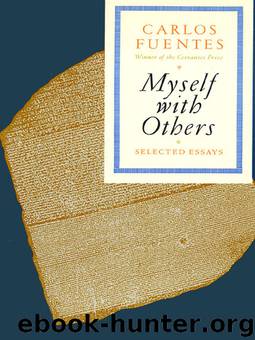Myself with Others by Carlos Fuentes

Author:Carlos Fuentes
Language: eng
Format: epub
Publisher: Farrar, Straus and Giroux
Published: 2015-05-13T16:00:00+00:00
Luis Buñuel and the Cinema of Freedom
In the first scene of An Andalusian Dog (1928), a young Spaniard called Luis Buñuel slowly puffs on a cigarette and sharpens a razor. He looks at the nocturnal sky. A passing cloud bisects the moon. Buñuel separates with his fingers the eyelids of a woman who looks at us and sees that we see her. Buñuel brings the razor close to the open eye and slits it with one swift slash. Vision overflows. Vision becomes contagious.
More than fifty years later, a Spaniard called Luis Buñuel—not an old man, simply a young man who now happened to be eighty-three—sat in the bare study of his house in Mexico City, surrounded by high monastery walls crowned with broken glass, and repeated his steadfast credo: “If only it were free, the cinema would be the eye of freedom. But for the time being, we can sleep in peace. The eye of the cinema is shackled by audience conformity and commercial interests. The day the eye of the cinema awakens, the world will catch fire!”
Ever since An Andaiusian Dog, for Buñuel the screen was a sleeping eye that could only be awakened by a camera as sharp as a razor, a nail, an ice pick: the eye of the cinema would be a wound that never heals.
The unity of Buñuelian cinema is born of a conflict between the way you see and what you see. And this conflict is inseparable from a pilgrimage, a going from the security of the enclosed place to the risks of the shelterless outdoors. Milan Kundera has said that the world changes when Don Quixote leaves the enclosed universe of his God and his library and goes out of himself to meet a changing world. This is both the Hispanic and the modernist root of Buñuel’s cinema: the Spanish hero is not Tom Jones or Robinson Crusoe, who are the product of the progressive peak attained by their society and are, in this sense, attuned to it. Nothing—the Inquisition, the Counter-Reformation, the Hapsburg monarchy—validates the creation of Don Quixote, whereas everything—the expansion of commerce, the rising middle class, Parliament, and political freedom—validates Robinson Crusoe. The English hero is invented thanks to society; the Spanish hero, in spite of society. The Spaniard is the hero of what is lacking, what is not there, what he hungers for, what he desires.
“Desire” is the key word for the understanding of the Buñuelian universe. But in him this most human, erotic, and earthbound of words achieves an almost mystical tone, as though desire were the sacrament that truly sends men and women on these daring pilgrimages of the psyche and soma where they confront both the dark night of the soul and the bondage of the flesh as though they were accomplishing some sort of priestly mission, a sacerdocium, a sacrifice through movement.
The erotic sacredness of the lovers in L’Age d’Or (1930) is inseparable from the sacrality of solitude, work, and fraternity in Buñuel’s version of Robinson Crusoe (1952).
Download
This site does not store any files on its server. We only index and link to content provided by other sites. Please contact the content providers to delete copyright contents if any and email us, we'll remove relevant links or contents immediately.
| Belgium | France |
| Germany | Great Britain |
| Greenland | Italy |
| Netherlands | Romania |
| Scandinavia |
Room 212 by Kate Stewart(5098)
The Crown by Robert Lacey(4795)
Endurance: Shackleton's Incredible Voyage by Alfred Lansing(4747)
The Iron Duke by The Iron Duke(4343)
The Rape of Nanking by Iris Chang(4193)
Joan of Arc by Mary Gordon(4088)
Killing England by Bill O'Reilly(3989)
Say Nothing by Patrick Radden Keefe(3972)
I'll Give You the Sun by Jandy Nelson(3424)
Shadow of Night by Deborah Harkness(3350)
Hitler's Monsters by Eric Kurlander(3324)
Mary, Queen of Scots, and the Murder of Lord Darnley by Alison Weir(3194)
Blood and Sand by Alex Von Tunzelmann(3185)
Eleanor & Park by Rainbow Rowell(3144)
Darkest Hour by Anthony McCarten(3114)
Margaret Thatcher: The Autobiography by Thatcher Margaret(3071)
Book of Life by Deborah Harkness(2919)
Red Famine: Stalin's War on Ukraine by Anne Applebaum(2914)
The One Memory of Flora Banks by Emily Barr(2851)
